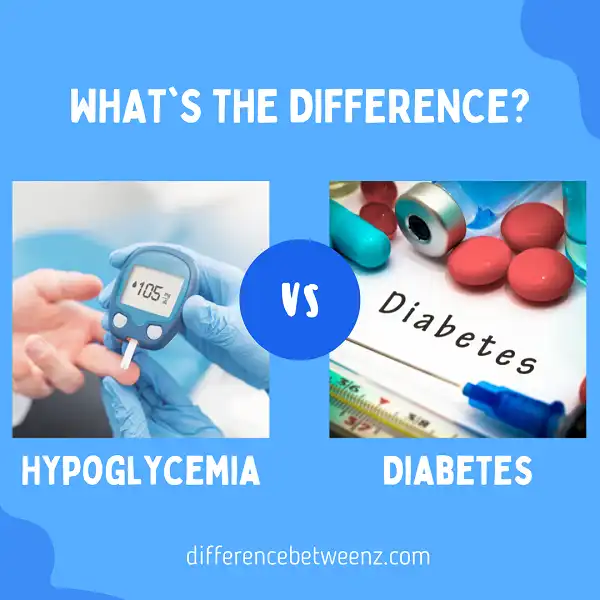Diabetes and hypoglycemia are two very different conditions, despite their similar names. Diabetes is a chronic condition that affects the body’s ability to produce or use insulin, while hypoglycemia is a sudden drop in blood sugar levels. Understanding the difference between these two conditions can help you better manage your diabetes if you have it, or identify potential health concerns if you experience hypoglycemia.
What is Diabetes?
Diabetes is a chronic condition characterized by high levels of sugar in the blood. There are two main types of diabetes: type 1 and type 2. Type 1 diabetes is often diagnosed in childhood, and it occurs when the body does not produce enough insulin. Type 2 diabetes occurs when the body does not properly use insulin, and it is often diagnosed in adulthood. Both types of diabetes can lead to serious health complications, including heart disease, stroke, kidney disease, and blindness. Early diagnosis and treatment are essential for managing diabetes and reducing the risk of developing these complications.
What is Hypoglycemia?
Hypoglycemia, also known as low blood sugar, is a condition in which the body’s blood sugar levels fall below normal. The body needs sugar for energy, and when levels drop too low, it can lead to serious health problems. Symptoms of hypoglycemia include feeling shaky, sweating, heart palpitations, and dizziness. If left untreated, hypoglycemia can lead to unconsciousness and even death.
Hypoglycemia is most often caused by an interaction between medication and diet. For example, people with diabetes who take insulin may experience hypoglycemia if they skip a meal or exercise more than usual. Anyone who takes medication that lowers blood sugar should be aware of the symptoms of hypoglycemia and how to treat it.
Difference between Diabetes and Hypoglycemia
Though diabetes and hypoglycemia both relate to blood-sugar levels, they are two distinct conditions.
- Diabetes is a chronic condition in which the body is unable to properly metabolize sugar.
- This can be due to a lack of insulin, resistance to insulin, or a combination of both.
- Over time, high blood sugar levels can lead to serious complications such as heart disease, stroke, and kidney damage.
- Hypoglycemia, on the other hand, is a condition characterized by low blood sugar levels.
- This can be caused by skipping meals, excessive exercise, or certain medications.
While hypoglycemia is not usually a serious condition, it can cause symptoms such as lightheadedness and dizziness. If left untreated, it can lead to more serious problems such as seizures or loss of consciousness.
Conclusion
Diabetes is a metabolic disease that results when the pancreas does not produce enough insulin or when the body cannot use properly the insulin it produces. There are two major types of diabetes: type 1 and type 2. In type 1 diabetes, the body does not produce any insulin at all. In type 2 diabetes, either the body does not produce enough insulin or the cells do not respond to insulin as they should. Most people with diabetes have type 2 diabetes. Diabetes can cause serious health problems including heart disease, stroke, blindness, kidney failure, and amputation of toes, feet, or legs. -Hypoglycemia (low blood sugar) is a condition in which blood sugar levels fall too low.


